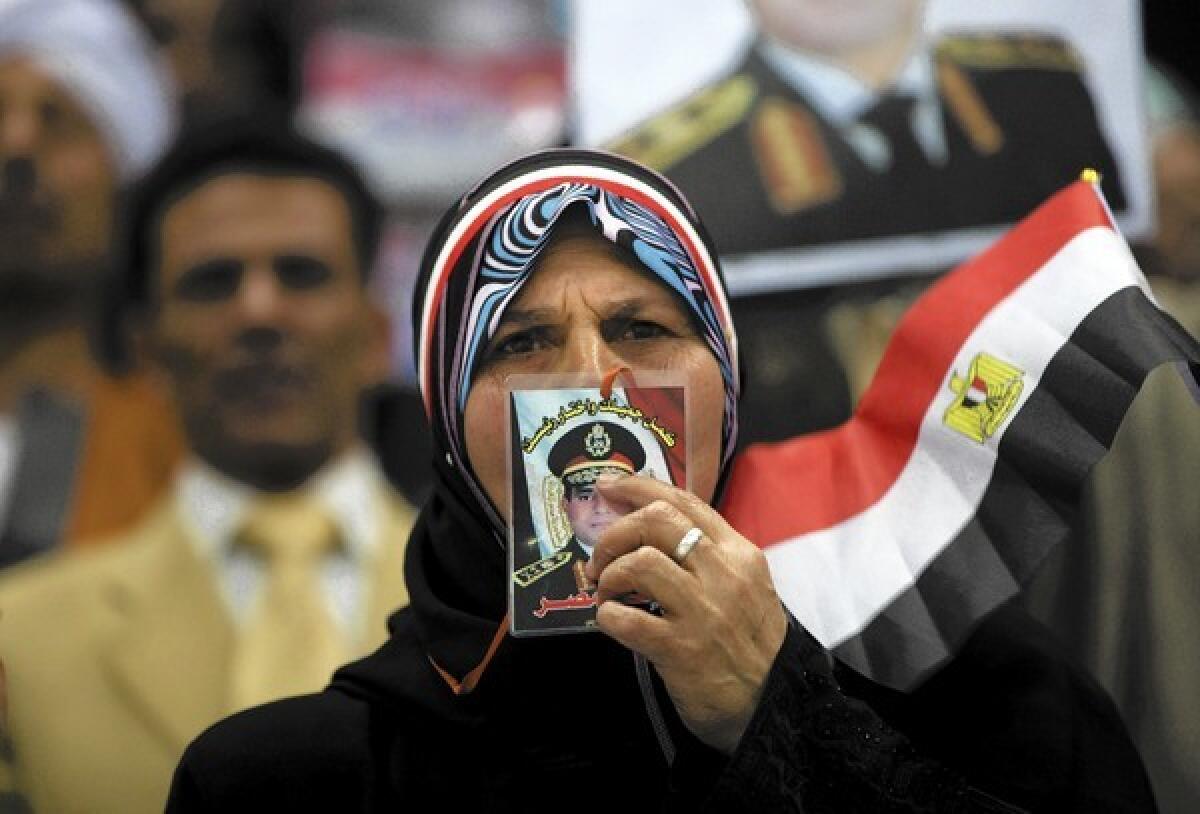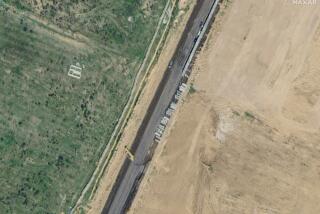Egypt to hold presidential vote by mid-April

CAIRO — Egypt’s military-backed government on Sunday declared its intention to hold presidential elections by mid-April, in what authorities described as a milestone on the path to democracy. The move came amid one of the most sustained crackdowns in decades on political opponents of a sitting Egyptian government.
The timing of the vote — now formally set to be held before parliamentary elections — was seen as likely to help key figures in the current administration, particularly army chief Abdel Fattah Sisi, cement their hold on power. Gen. Sisi is the country’s de facto leader and is considering a run for president.
Holding the presidential vote first would help the victor forge alliances and ensure backing among lawmakers. Sisi is enormously popular and would probably win easily if he runs, but he would have to relinquish his defense post in order to do so.
The new constitution enhances the powers of the military, so the general could wield as much or more authority behind the scenes than as president.
The election announcement came one day after commemorations of the third anniversary of Egypt’s popular revolt that led to the toppling of autocratic President Hosni Mubarak. In what many of the architects of that 2011 uprising saw as an ironic reversal, the day was largely given over to elaborate official celebrations lionizing Sisi and the interim government. The officially sanctioned commemorations were centered in Tahrir Square, the epicenter of the anti-Mubarak revolution.
Clashes on Saturday between police and government opponents, Islamist or secular, resulted in at least 49 deaths, hundreds of injuries and more than 1,000 arrests, according to Egyptian authorities cited by state media. It was the most violent day since Oct. 6, when more than 50 people died in clashes between demonstrators and security forces.
Announcing election plans in a nationally televised speech, interim President Adly Mansour also vowed that authorities would continue to take a hard line against the forces of “dark terror.”
In its seven months in power, the military-backed leadership has carried out a wide-ranging campaign against its political opponents, both Islamist and secular, even as it battles an Islamist insurgency in the Sinai Peninsula that has begun to spread to mainland Egypt. The latter is often cited to justify the former.
The Sinai threat appears to be genuinely intensifying, however. On Sunday, suspected militants attacked a bus carrying Egyptian soldiers in the north of the peninsula, killing four of the conscripts and injuring 13 others, state media reported.
The attack brought the military’s two-day death toll in the restive Sinai to nine. Five Egyptian soldiers were killed Saturday in a helicopter crash. A Sinai-based militant group claimed it had shot down the chopper, and it released a video to support that claim.
The military did not immediately disclose why the helicopter went down. If the claim by the group — Ansar Bayt al Maqdis, or Partisans of Jerusalem — is true, that would mark a new measure of sophistication on the part of Islamic insurgents battling Egyptian forces in the peninsula.
Until now, there has been no indication the group possessed or was willing to use surface-to-air missiles, said David Barnett, a research associate at the Foundation for Defense of Democracies, a Washington think tank, who studies militant groups in Sinai. Such a development would be militarily important because of the significant role of helicopters in Egyptian operations in northern Sinai, he said.
It could also carry damaging repercussions for the tourism industry in the southern part of the peninsula and on the Red Sea, Barnett said. Egypt’s tourism industry has cratered during the last three years of political upheaval, but resorts in Sinai have retained some appeal, in part because they are seen as distant from turmoil in Cairo.
Ansar Bayt al Maqdis also claimed responsibility for a string of bombings Friday in Cairo, on the eve of the anniversary. The most serious of those, a car bomb planted outside a downtown police headquarters, killed four people. Two people were killed in smaller explosions elsewhere in Cairo.
In his televised address, the interim president seemed mindful of criticism that has erupted over mass arrests of opponents of the government. Mansour pledged expedited handling of those who have been detained, often without charges.
On Sunday, a young American who had been working in Egypt as a freelance translator and journalist was freed four days after being detained by Egyptian authorities, the U.S. Embassy said.
Jeremy Hodge, 26, of Los Angeles had been picked up Wednesday at his Cairo apartment by police, who also detained his Egyptian roommate, Hossam Meneai, a filmmaker. Meneai was still being held, according to friends of the two.
Detentions of murky provenance have become commonplace in recent months as Egypt’s interim government imposes increasingly authoritarian measures.
Three journalists from the news channel Al Jazeera English have been held since Dec. 29. Authorities have accused them of making false reports and of having links to the Muslim Brotherhood, the movement of deposed Islamist President Mohamed Morsi.
The interim government, which took power in July after a popularly supported coup, initially moved mainly against the Brotherhood. The crackdown has since broadened to include secular activists, academics and journalists.
Special correspondent Amro Hassan contributed to this report.
More to Read
Start your day right
Sign up for Essential California for news, features and recommendations from the L.A. Times and beyond in your inbox six days a week.
You may occasionally receive promotional content from the Los Angeles Times.






